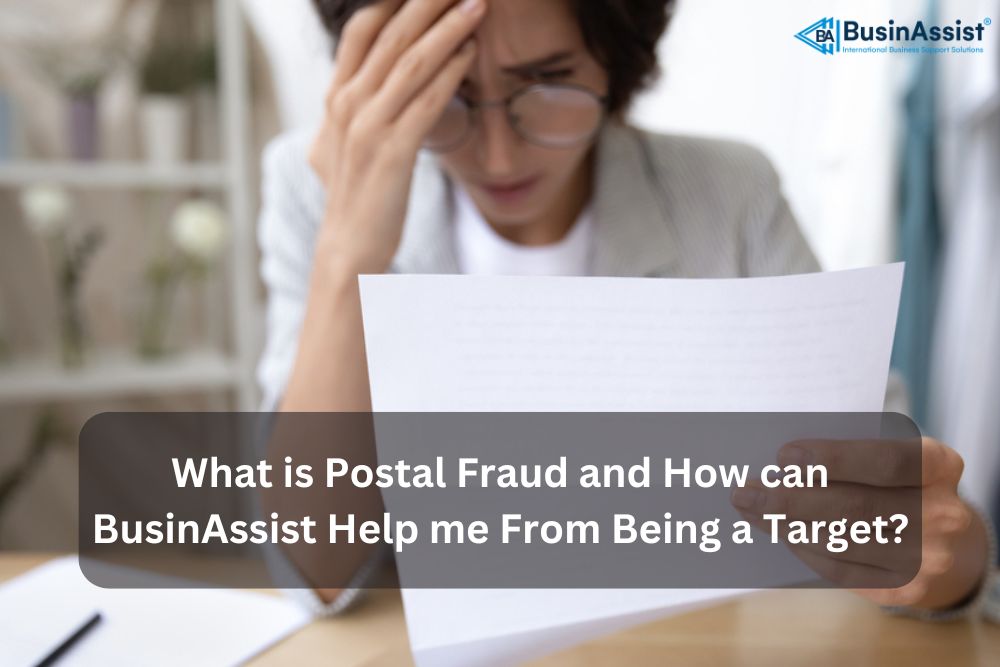Last Updated on December 18, 2025 by Joy Kyalo

Postal scams have become so rampant and crafty making them hard to spot. It may be hard to differentiate between scam mail and offers from companies.
Using clever techniques, scammers may write to you persuading your bank details or asking you to send them money. They may also use lotteries, which can be very tempting to many, and you are asked to pay additional fees to claim your winnings.
In this blog, we will discuss about What is Postal Fraud and types of postal scams to look out for, how you can protect yourself, and how BusinAssist can help you from being a target.
What is postal fraud?
A postal fraud refers to the general pretense to use mail or post to obtain money or personal information in an unfair way. Scammers send letters or mail with enticing offers that often sound attractive but don’t exist, to lure you to send money or rather personal or bank information.
These schemes typically involve a catch, such as paying an upfront fee to claim winnings or receive a promised good or providing personal or bank details to proceed to the next stage.
What are common examples of postal fraud?
Here are common examples of postal fraud to help you differentiate between offers and scam mail.
Advance fee fraud: These scams involve an upfront fee to receive a prize. Once you fall into the trap, you become an easy target and scammers may demand further payments before releasing the supposed prize.
Fake lotteries and prize draw: These are the most common scams that people fall into since they are enticing. Who doesn’t need to win a prize for doing nothing? With fake lotteries and prize draws, you receive a letter congratulating you on winning a cash prize, even though you never entered any lottery or draw. To claim your winnings, you’re asked to pay additional fees
Unclaimed inheritance schemes: Scammers may use a legal firm to send you mail claiming that someone has left you money in their will. They may also send you mail claiming that one of their clients has died and he did not have any family members to leave their inheritance to and you have been selected to receive a certain amount of inheritance.
Hard luck stories: Scammers play on empathy, claiming they need money due to an accident or urgent medical expenses.
Brushing scams: These scams involve sending cheap-to-ship items and then falsely logging them as genuine sales to artificially inflate sales volumes.
Investment and pyramid schemes: Investment and pyramid schemes scam: This is the point where you are required to sum up some money and enter the program in order to receive a reward in the form of a financial gift or present for persuading your friends to join the scheme. The product which is being advertised usually doesn’t have any value or it is non-existent, so the money you spend, time you devote, and energy you put into it is a waste.
Charity contributions: Scammers take advantage of people’s goodwill and take their cash meant for people in need.
Pension offers: Scammers will try to gain people’s trust by promising to transfer their money somewhere ‘safer’.
Is mail fraud the same as spam emails?
Fraud and spam are different. Fraud is when someone tries to trick you into giving them personal or financial information whereas spam is an unsolicited email that often contains commercial messages or website links.
How can I protect myself from postal scams?
If you receive a postal scam, there are things you can do to avoid the scammers getting your money or personal information. These are;
- Verify if the information is true. You can do a Google search of the organization to know what the company is all about. You can even go further and get their contact information to reach out to them.
- Ignore the mail. Do not use the contact details listed on the scam letter, as it’s likely they’ll be set up by the scammer and you might end up using money per minute by contacting them.
- Report the scammers to local authorities.
- Reject a letter that you think is a scam and throw it away.
- If there is a way you can opt out from the mail list, do so. These will keep you clear from receiving unsolicited mail.
- Registering with a UK virtual office provider will stop many of the direct mailing companies from contacting you.
What to look out for with postal fraud
- Bad spelling
- The price is too good to be true
- Processing fee
- Uses a general address like a PO Box.
- Asks you to send money to claim your prize.
- Watermarks like win, barcodes, seals, or codes are used.
- Unsolicited requests
How BusinAssist can help with postal fraud
BusinAssist helps businesses manage their mail and communications and can assist in several ways to protect you from postal fraud.
To prevent yourself or your business from postal fraud, you can register for a cheap virtual office where you will get a business address with mail handling services. With a London virtual address, it will be easy to get authentic mail since we will be forwarding your mail to your address or scanning the necessary mail and sending it to your email. This will keep you away from scammers.
BusinAssist can identify suspicious mail and filter out potential scams by flagging unusual or deceptive offers, it helps you avoid falling victim to fraud. We also ensure that sensitive information, such as personal or financial details, is handled securely. Through reducing the risk of data exposure, it lowers the probability of falling victim to scams.
Bear in mind that real marketing emails from good-standing firms are contrary to fake mail fraud. While these both disturb our privacy, marketing emails are legal and genuine and market our dreams. Mail fraud tries to unlawfully steal money from you so you should stay vigilant to protect your business.
If you suspect you have given your details or paid money to a scammer, you should call your bank immediately using their helpline number and also contact the local authorities.
It is better to use a virtual office service where your provider can identify suspicious mail and filter out potential scams.
BusinAssist will ensure that sensitive information for your business is secure from postal fraud. For more information, contact us at info@BusinAssist.com.
Read Also:
- What is an EORI Number? – A Guide
- What is a VAT registration number? – A complete guide
- What is a First Gazette Notice for Compulsory Strike-Off?
- How Long Does It Take to Sponsor an Employee in the UK?
- What are the Advantages and Disadvantages of being VAT Registered?
- What Are the Disadvantages of a Dormant Company?
- Everything You Need to Know About Companies House Default Address
- Best eCommerce Platforms for Small Businesses in the UK
- Right to Work in the UK: How to Obtain a Share Code Online

The BusinAssist Editorial Team has 15+ years of experience writing about small business and company formation in the UK, Canada, and the USA. We simplify complex processes and provide practical insights to help entrepreneurs succeed. Business Assist with BusinAssist – your partner for business success.
